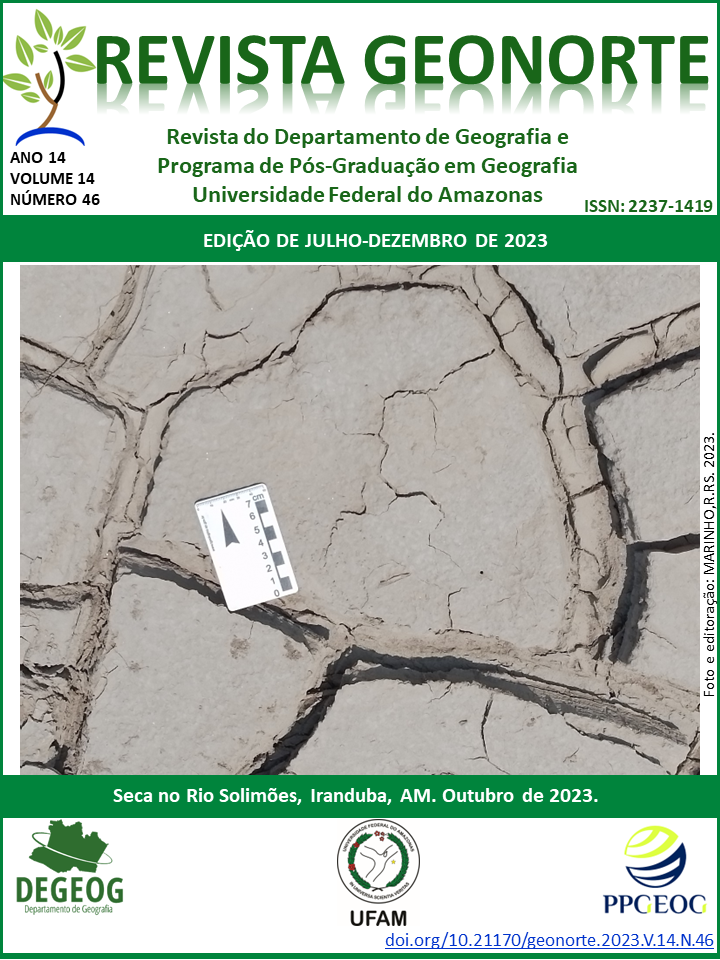The Construction of Citizenship Supported for instruction and learning in geography
DOI:
https://doi.org/10.21170/geonorte.2023.V.14.N.46.01.25Abstract
This text was prepared with the objective of evidencing the pedagogical practices that can be discussed in the superior course of geography and in the discipline of geography in basic education, since the social contrasts are evidenced through the teaching of the political organization of the Nation-State, within the national territory are the political actions developed by the legislative and executive powers that shape the economy, health, security, education, social security and must have their clarification in the different levels of education, with the specificity that each one of them possesses. In this sense, the teaching of geography involves cultural and behavioral awareness, propound with the knowledge acquired from past generations, a promising dialogue with the present, seeking new concepts for the renewal and improvement of techniques for teaching and learning. In this way, the hermeneutic approach was used for critical and humanistic literary adaptation, in this perspective, explaining the state organization implies a conception directly acquired in the texts of the critical school of geography, where from it space is considered a product of human actions that shape it. With the understanding that the construction of citizenship permeates the skills and competences of the geography teacher when applying political geography in the classroom at the educational moment, whether in higher or basic education, it will be their scientific knowledge that will make the difference, and this action it is related to their professional training, with the teaching experience and their pedagogical praxis, what is exposed to them and what they are willing to cognitively learn to build their knowledge.
Downloads
References
BANDURA, Albert – Azzi. Teoria Social Cognitiva. São Paulo: Editora Atmed, 2008.
BOROWSKI, Lara Moraes; FONSECA, Antonio Angelo Martins da. O Ensino da geografia política local na escola como perspectiva de efetivação da cidadania. In: Revista Geografia Ensino & Pesquisa, v. 21, n. 02, 2017. p. 88-90.
BRASIL. Constituição Federal do Brasil de 1988. Artigos 205 a 214. Brasília: Senado Federal, atualizada 2018.
CALLAI, Helena Capetti. A geografia ensinada: os desafios de uma educação geográfica. In: Formação de professores: conteúdos e metodologias no ensino de geografia. Goiania: NEPEG, 2010. p. 15-38.
CASTRO, Iná Elias. Geografia e Política: Território, escalas de ação e instituições. Rio de Janeiro: Bertrand Brasil, 2005.
CASTRO, Sheila; COQUEIRO, João Carlos Pereira; LOUREIRO, Armando Paulo Ferreira. A Produção do Fracasso Escolar e a perda de Consciência de Si: Uma Análise a partir das Políticas Públicas para a Educação de Jovens e Adultos (EJA). In: Revista Labirinto, ano XIX, v. 30, 2019. 203-222.
CAVALCANTI, Lana de Souza. A geografia escolar e a cidade: ensaios sobre o ensino de geografia. Campinas: Papirus, 2012.
FREIRE, Paulo. Pedagogia da autonomia: saberes necessários à prática educativa. São Paulo: Paz e Terra, 2003.
FREIRE, Paulo. Educação como prática da liberdade. Rio de Janeiro: Paz e Terra, 1983.
GADOTTI, Moacir e TORRES, Carlos Alberto. Estado e Educação popular na América Latina. Campinas: Papirus, 1992.
LACOSTE, Yves. A Geografia, isso serve, em primeiro lugar, para fazer a guerra. São Paulo: Papirus, 1988.
MOREIRA, Ruy. O discurso do avesso: para a crítica da geografia que se ensina. São Paulo: editora Contexto, 2014. 189p.
RAFFESTIN, Claude. Por uma Geografia do Poder. São Paulo: editora Ática, 1993.
SANTOS, Milton. Metamorfoses do Espaço Habitado: fundamentos Teórico e metodológico da geografia. Hucitec: São Paulo, 1988.
SANTOS, Milton. Espaço do cidadão. São Paulo: Edusp, 1987
SILVA, Diogo Jordão; SILVA, Silvana Cristina da. Contribuições da Geografia Política para a formação do aluno cidadão. In: Anais do VII Congresso Brasileiro de Geógrafos, 2014. p. 01-12.
SOUSA, Maria Goreti da Silva. A formação continuada e suas contribuições para a profissionalização de professores dos anos iniciais do ensino fundamental de Teresina Pi: revelações a partir de histórias de vida. Dissertação (Mestrado em Educação) Universidade Federal do Piauí, 2008, 130 f.
Downloads
Published
How to Cite
Issue
Section
License
Autores que publicam nesta revista concordam com os seguintes termos:
- Autores mantém os direitos autorais e concedem à revista o direito de primeira publicação, com o trabalho simultaneamente licenciado sob a Licença Creative Commons Attribution que permite o compartilhamento do trabalho com reconhecimento da autoria e publicação inicial nesta revista.
- Autores têm autorização para assumir contratos adicionais separadamente, para distribuição não-exclusiva da versão do trabalho publicada nesta revista (ex.: publicar em repositório institucional ou como capítulo de livro), com reconhecimento de autoria e publicação inicial nesta revista.
- Autores têm permissão e são estimulados a publicar e distribuir seu trabalho online (ex.: em repositórios institucionais ou na sua página pessoal) a qualquer ponto antes ou durante o processo editorial, já que isso pode gerar alterações produtivas, bem como aumentar o impacto e a citação do trabalho publicado (Veja O Efeito do Acesso Livre).






